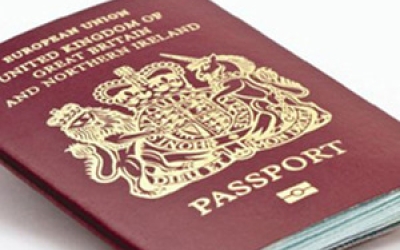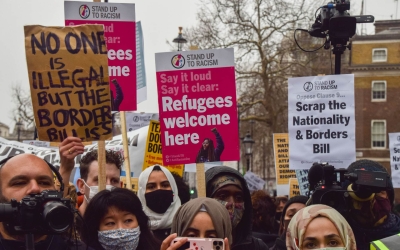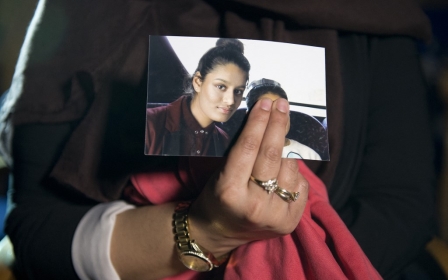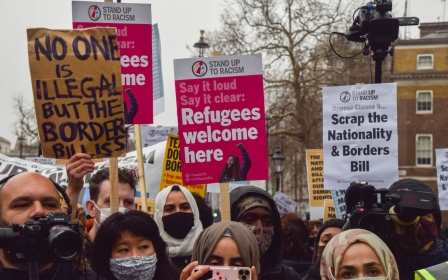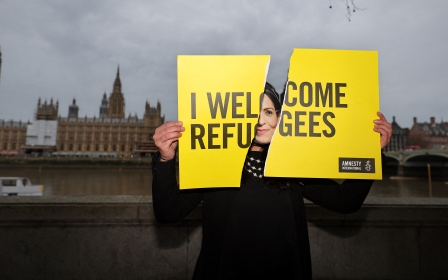British Muslims' citizenship reduced to 'second-class' status, says report
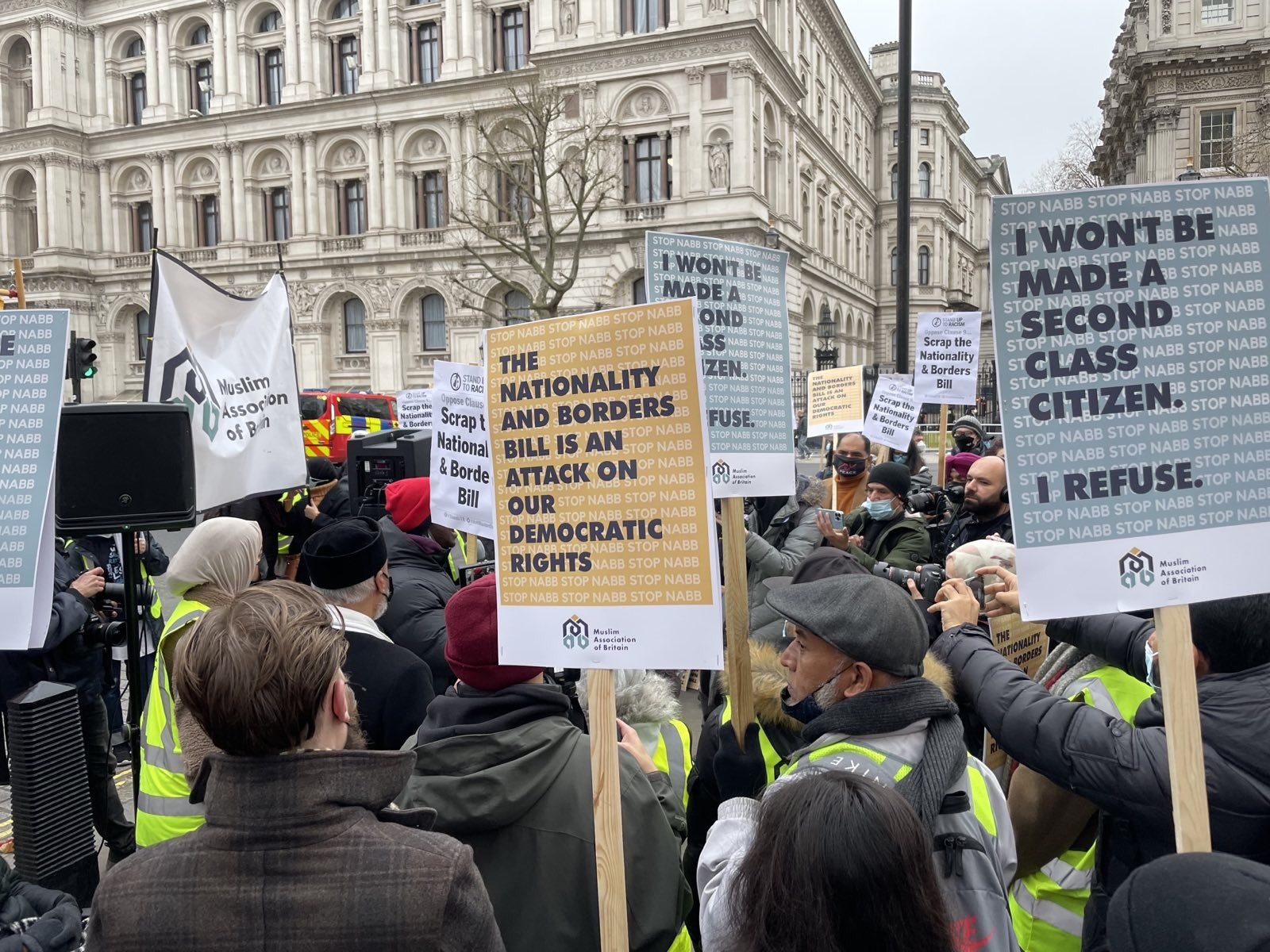
Many British Muslims have been reduced to "second-class" citizens as a consequence of citizenship-stripping powers introduced by the UK government since 2002, according to a new report by a race equality think tank.
The report by the Institute of Race Relations (IRR), entitled "Citizenship: from right to privilege", follows the recent extension of the controversial powers - which have been extensively used against British nationals who travelled to Syria - in the Nationality and Borders Act to allow citizenship to be removed from a person without notice in some circumstances.
'None of the estimated six million British citizens with access to another citizenship can feel confident in the perpetual nature of their citizenship'
- Frances Webber, Institute of Race Relations vice chair
Clause nine of the new law, which was passed in April after months of protests by human rights campaigners and opposition in the House of Lords, allows the home secretary to deprive somebody of citizenship without notifying them if it is not practically possible to do so, because of national security or diplomatic considerations, or "for any other reason".
Previously, British nationals whose citizenship was revoked were required to be notified by letter. Those stripped of citizenship have a right to challenge the decision through an appeals process, and critics say that removing the need to notify somebody prevents them from exercising that right.
A number of people have successfully challenged the government's use of the powers.
New MEE newsletter: Jerusalem Dispatch
Sign up to get the latest insights and analysis on Israel-Palestine, alongside Turkey Unpacked and other MEE newsletters
In May 2021, a man returned to the UK after years stranded abroad, after the government conceded it had wrongly assessed he was entitled to Bangladeshi citizenship.
The UK and citizenship-stripping powers
+ Show - HideThe UK has been described by researchers as a “global leader in using citizenship deprivation as a counterterrorism measure”.
Historic citizenship-stripping powers targeted at naturalised citizens on disloyalty grounds had largely fallen into disuse prior to 2002, when the government introduced new measures in an attempt to revoke the citizenship of Abu Hamza, an Egyptian-born cleric subsequently convicted of terrorism in the US.
The 2002 legislation allowed for British-born nationals as well as naturalised citizens to lose their nationality rights. Successive governments gradually broadened the scope of the powers so that home secretaries can now deprive anyone of citizenship if they are satisfied that doing so is “conducive to the public good” and would not leave an individual stateless.
No criminal conviction is required. Letters often state that individuals have been assessed as presenting “a risk to the national security of the United Kingdom”.
The government’s use of the powers surged to unprecedented levels in response to the perceived threat posed by British nationals returning from Syria.
Between 2010 and 2015, 33 people were stripped of their citizenship, according to Home Office figures. In 2016, 14 people were deprived, and in 2017 the number jumped to 104.
In 2018, the figure was 21, and in in 2019 - when Shamima Begum was among those targeted - it was 27. It then dropped to ten in 2020 and eight in 2021.
Some subjects of citizenship-stripping orders argue that they have been left effectively stateless, because the government bases its assessment that they are dual nationals on a right of citizenship to a parent’s country of birth, even if they have never taken up that citizenship or even visited the country.
In some cases the Special Immigration Appeals Commission, which rules on citizenship cases, has agreed: it has ruled in favour of British nationals of Bangladeshi descent on the grounds that Bangladesh does not consider them citizens if they have not claimed Bangladeshi nationality before the age of 21.
Human rights organisations and lawyers have compared the powers to “medieval exile and banishment”. Critics also point out that the powers create a two-tier system in which only those deemed to be dual nationals are at risk of losing their British citizenship; a measure that discriminates against naturalised citizens, immigrants and their children.
Though it is illegal under international law to leave someone stateless, the UK government has used the powers against people who are dual nationals and against others who it argues are entitled to the citizenship of another country.
Frances Webber, the vice-chair of the IRR and the report's author, wrote: "The message sent by the legislation on deprivation of citizenship since 2002 and its implementation largely against British Muslims of South Asian heritage is that, despite their passports, these people are not and can never be 'true' citizens, in the same way that 'natives' are.
"While a 'native' British citizen, who has access to no other citizenship, can commit the most heinous crimes without jeopardising his right to remain British, none of the estimated six million British citizens with access to another citizenship can feel confident in the perpetual nature of their citizenship."
Citing racist media coverage, politicians' statements and the government's Prevent counter-terrorism programme, the report described citizenship-stripping as "just one aspect of measures targeting Muslim communities, in Britain and abroad, in the past two decades, which have helped to turn British Muslims in the UK into a 'suspect community'".
The report describes the criteria for removal of citizenship as "nebulous and undefined" and warns of a risk of its use for political purposes, highlighting the recent case of Shamima Begum.
Begum, who travelled as a 15-year-old to Islamic State (IS)-controlled Syria in 2015, was stripped of her citizenship in February 2019 on the grounds she posed a "national security threat" after she was located in a Kurdish-controlled detention camp in northeastern Syria for the families of suspected IS fighters.
Last month it was reported that UK authorities helped cover up the role of a Canadian intelligence operative in trafficking Begum to Syria.
"It raises the question: was Begum's citizenship removed to divert attention from western agencies' prioritisation of intelligence gathering over safeguarding vulnerable trafficked girls?" said Webber.
Windrush comparison
The report points out that before 2003, no removal of citizenship had been authorised by the British government for 30 years, but since then there have been at least 217 removals of citizenship, with 104 removals in 2017 following the collapse of IS in Syria.
Middle East Eye exclusively reported in December 2017 on the use of citizenship-stripping powers against British nationals in Syria, revealing that aid workers were also being targeted.
"Changes to citizenship law which have created these classes of citizenship were brought in to target British Muslims of South Asian and Middle Eastern heritage," said Webber.
"Such divisions act as a constant reminder to minority ethnic citizens that they must watch their step, and reinforce racist messages about 'undeserving' racialised groups unworthy of being British."
Webber also compared the current situation to the UK's Windrush scandal, which surfaced in 2018, when British journalists uncovered stories about long-term legal residents from the Caribbean who were wrongly caught up in a UK Home Office crackdown targeting suspected illegal immigrants.
Thousands lost jobs, homes and the right to free medical care, many because they arrived as children and were unable to produce paperwork proving their right to live in the UK. Some were detained and scores were deported.
"The 'deportation logic' on which the deprivation powers are based - get rid of them, regardless of family ties, or how long they have lived here - is the logic that deprived the Windrush generation of their livelihoods, their homes, in some cases their freedom and their country," said Webber.
Prior to becoming law, the Nationality and Borders Bill came under intense criticism from human rights groups, the legal profession and the UK parliament's own Joint Committee on Human Rights.
Earlier this year, the United Nations also criticised the bill, with UN experts saying the British government's use of citizenship-stripping powers was likely discriminatory and unlawful because of its disproportionate impact on Muslim and migrant communities.
A Home Office spokesperson said deprivation of citizenship decisions were taken "after careful consideration of the facts and in accordance with international law", and suggested the powers were being used against "the most dangerous people, such as terrorists, extremists and serious organised criminals".
The spokesperson said: "We make no apology for doing whatever is necessary to protect the UK from those who pose a threat to our security."
Middle East Eye delivers independent and unrivalled coverage and analysis of the Middle East, North Africa and beyond. To learn more about republishing this content and the associated fees, please fill out this form. More about MEE can be found here.


